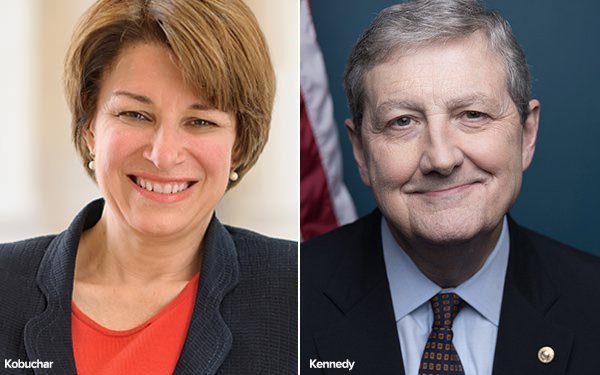
Lawmakers in the Senate are renewing their
attempt to pass a controversial bill that would allow news publishers and broadcasters to jointly negotiate with large online platforms including Google and Facebook.
The Journalism
Competition and Preservation Act, introduced Friday by Senators Amy Klobuchar (D-Minnesota) and John Kennedy (R-Louisiana), specifically would grant an antitrust exemption to news organizations with
fewer than 1,500 employees, in order to allow those groups to hold talks with online platforms that have at least 50 million U.S.-based users.
The bill would also require platforms to
negotiate in good faith with news organizations, and allow print news publishers to demand arbitration if unable to reach an agreement with a platform.
Additionally, the measure would prohibit
platforms from discriminating against a news provider based on its content or views -- a prohibition that critics say would contribute to the spread of misinformation.
advertisement
advertisement
Lawmakers have
introduced similar versions of the act in prior years, but the full Senate didn't vote on those previous proposals.
Klobuchar on Friday cited the emergence of artificial intelligence as a new
argument for the bill.
“Local news is facing an existential crisis, from ad revenues plummeting and newsrooms across the country closing to artificial intelligence tools taking
content,” Klobuchar stated Friday. “To
preserve strong, independent journalism, news organizations must be able to negotiate on a level playing field with the online platforms that dominate news distribution and digital
advertising.”
The News/Media Alliance, which supports the bill, also pointed to the recent growth of artificial intelligence tools.
Executive vice president and
general counsel Danielle Coffey stated Friday that emerging artificial intelligence technologies show a need for compensation, adding that “content creators may soon see even less return than
what they receive today.”
“We must ensure that the digital ecosystem returns value back to the people who deliver high-quality journalism we all rely on around the world,”
she stated.
The News/Media Alliance also supported prior versions of the bill, while the tech industry and digital rights groups opposed the proposed legislation.
Among other
arguments, critics say the bill would effectively revise copyright law by requiring Google and Facebook to pay for the ability to display links to outside publishers. Copyright law as it currently
stands has been interpreted to allow Google, Facebook and other sites to display headlines and snippets for free.
Public Knowledge, which objects to the bill, stated Friday that the measure
would endanger “both local journalism and the open internet.”
The bill's “elaborate” antitrust exemption “will only serve to compound the biggest challenges in
our news and information landscape: consolidation of power, distance and disengagement of news conglomerate owners from the communities they serve, and the rampant spread of misinformation on the
internet," Lisa Macpherson, senior policy analyst at the organization, stated.
New artificial intelligence tools like Bing Chat and Google's Bard “may require a policy
response,” she said, but added that “hastily changing copyright law to benefit cartels of major news publishers – to address purely speculative harms – would be
unwise.”